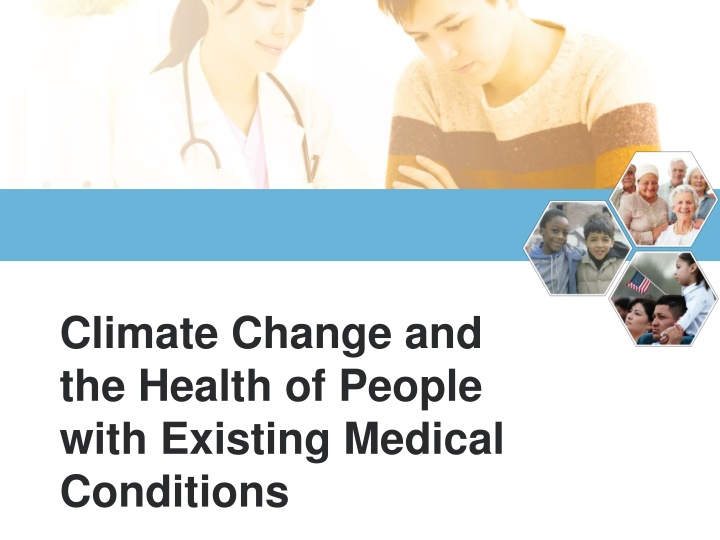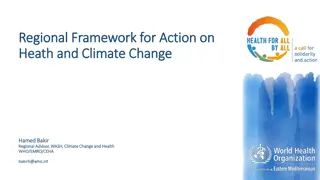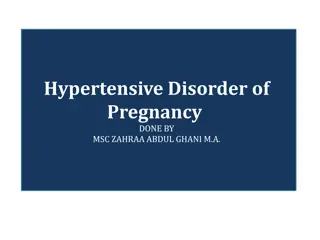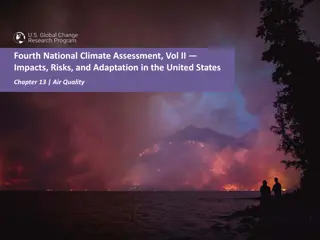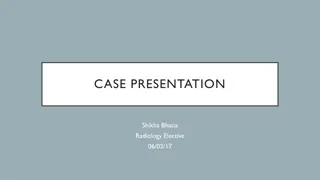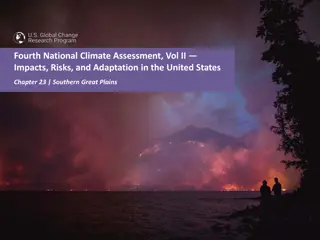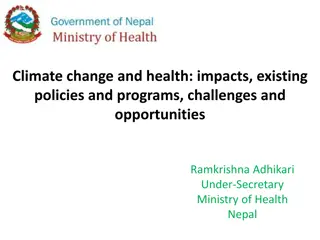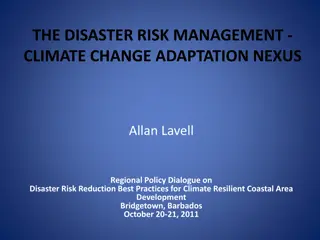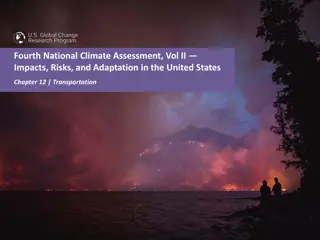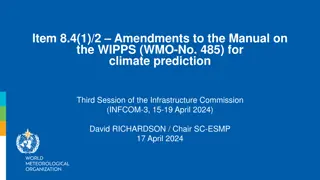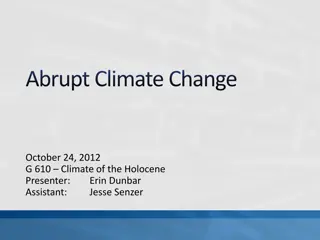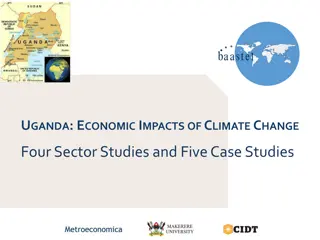Climate Change and Health Impacts on People with Medical Conditions
Climate change poses significant risks to the health of individuals with existing medical conditions, making them more vulnerable to illnesses and adverse health effects. Common chronic medical conditions such as heart disease, diabetes, asthma, COPD, Alzheimer's disease, and mental illness can exacerbate sensitivity to climate-related impacts, including extreme heat, weather events, and poor air quality. Understanding these connections is crucial for healthcare planning and supporting at-risk populations.
Download Presentation

Please find below an Image/Link to download the presentation.
The content on the website is provided AS IS for your information and personal use only. It may not be sold, licensed, or shared on other websites without obtaining consent from the author.If you encounter any issues during the download, it is possible that the publisher has removed the file from their server.
You are allowed to download the files provided on this website for personal or commercial use, subject to the condition that they are used lawfully. All files are the property of their respective owners.
The content on the website is provided AS IS for your information and personal use only. It may not be sold, licensed, or shared on other websites without obtaining consent from the author.
E N D
Presentation Transcript
Climate Change and the Health of People with Existing Medical Conditions
The US Climate Health Assessment What is it? An assessment of the risks climate change poses to human health in the United States An Interagency product of the US Global Change Research Program (USGCRP) Part of the ongoing National Climate Assessment (NCA) process Who wrote it? A team of ~100 Federal employees, contractors, and grantees from eight U.S. Federal agencies: HHS (NIH, CDC, NIOSH, ASPR, FDA, SAMHSA), NOAA, EPA, USDA, NASA, USGS, DOD (USUHS), VA. Health2016.globalchange.gov Climate change is a significant threat to the health of the American people.
Vulnerability Vulnerability is the tendency or predisposition to be adversely affected by climate-related health effects, and encompasses three elements: exposure sensitivity or susceptibility to harm the capacity to adapt to or respond to a climate change threat. While all Americans are affected by climate change, some groups are disproportionately vulnerable to climate health impacts.
Existing Medical Conditions and Climate Change People with existing medical conditions are at increased risk for illness and death from climate change-related impacts on health including: changing exposures to extreme heat extreme weather events poor air quality Existing medical conditions can make individuals more sensitive to these exposures, increasing the potential for health impacts and worsening symptoms.
Common Chronic Medical Conditions People with the following illnesses should be aware that: Heart Disease. Drugs used to treat heart diseases, such as diuretics and beta-blockers, can make people with heart disease more sensitive to heat stress. Diabetes. Diabetes increases sensitivity to heat stress. Extreme weather events can also present challenges for diabetics because these events can limit access to healthcare, medicine, and food needed to stay healthy. Asthma and COPD. Patients with asthma and COPD are more sensitive than the general population to changes in outdoor air quality made worse by climate change. Alzheimer s Disease. Alzheimer s disease can impair judgment and responses in a crisis situation, such as an extreme weather event, which can place people at greater risk. Mental Illness. Some medications for certain mental illnesses can increase sensitivity to heat stress. Extreme weather events may also disrupt communication lines and social support networks that people with mental illnesses need to stay healthy.
For More Information Factsheet: Climate Change and the Health of People with Existing Medical Conditions www.epa.gov/climate-impacts/communicating- vulnerabilities-climate-change-existing-health- conditions
Additional Resources EPA Resources: www.epa.gov/climate-impacts USGCRP Climate and Health Assessment: health2016.globalchange.gov
